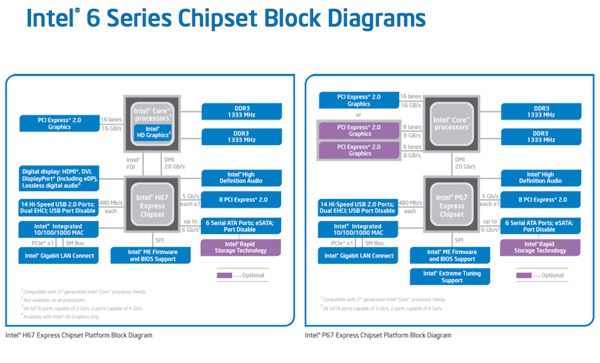More specifics of the problem affecting Intel's 6 Series chipset (codenamed Cougar Point) have emerged courtesy of Anandtech. Speaking with Steve Smith, VP and Director of Intel Client PC Operations and Enabling, the site was able to confirm that the fault affects both P67 and H67 chipsets, pin-pointing the problem to a transistor that's connected to the 3Gbps SATA II ports.
Cougar Point has two sets of SATA ports: four that support 3Gbps operation and two that support 6Gbps. For the first set Intel states that performance of SATA-linked devices "may degrade over time". However, since 6Gbps SATA III circuits have their own independent clocking trees these ports will be unaffected by the problem.
Apparently an OEM that was testing the platform with extreme heat and voltage environments originally discovered the problem and reported it back to Intel. The chip giant believes that no end users have been affected so far – and even if they are at least data loss isn't a problem. Intel estimates that the failure rate over a 3-year system life would be about 5%, which is high enough for the company to stop shipments and work on a silicon fix.

Current 6-series motherboard owners worried about performance issues are advised to try and only use ports 0 and 1 (the 6Gbps ports) until they can get a replacement or fix. Of course, for those with more than a couple of drives this will be impossible to do, but thankfully many motherboard makers often support additional SATA ports through third-party chipsets, or on a PCI-E SATA or RAID controller, and these will remain unaffected.
The scenario is a little less clear for Sandy Bridge notebooks since they don't usually have a lot of storage bays and thus don't always use all of the ports a chipset offers. If the design only uses SATA ports 0 and 1 then the end user would never encounter an issue and models currently in the pipeline shouldn't be affected by any delays, at least in theory.